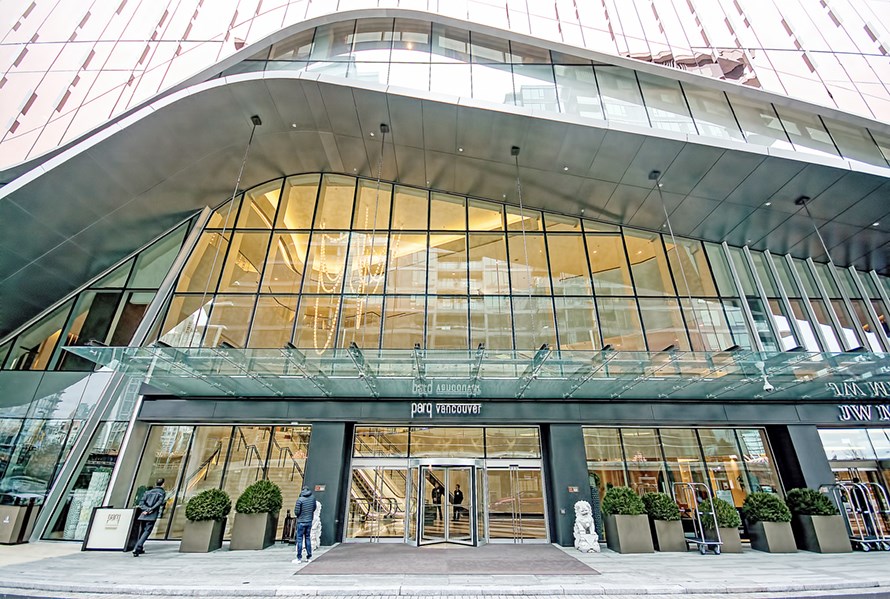Vancouver is a bright point among Western Canada’s hotel markets, one that continues to surprise Carrie Russell, managing director of HVS Canada.
Downtown hotel occupancy is averaging 79.4 per cent this year, and downtown hotels are posting some of the strongest revenue growth of any in the country. Revenue per available room (RevPAR) is up 11.6 per cent this year, and average daily rates are up 10 per cent. A more modest growth trend of 7 per cent is expected for both measures in 2019, moderating further to 5.7 per cent in 2020 – assuming the forecast is right.
“I have been wrong on the projections for four years now, to the low side,” Russell said while reviewing the hotel sector with Scott Duff, vice-president of CBRE Hotels, at the annual Western Canadian Lodging Conference in Vancouver on November 20. “RevPAR growth at 11.6 per cent this year with a brand new hotel in the market is shocking, in some ways.”
The new hotel stock includes the 329-room JW Marriott Parq Vancouver – the conference venue – and, more recently, Executive Hotels & Resorts’ 202-room Exchange Hotel.
Perhaps the most amazing detail in Russell’s review of the market was that downtown Vancouver, for all its strength, has just 118 units set to open in 2019 and zero planned for 2020. An additional 55 rooms at the airport in both 2019 and 2020 will do little to alleviate the pressure there, driving more guest traffic to Fraser Valley properties.
“Without significant new supply coming into the city, how much can rates continue to grow?” Russell asked.
The loss of two West End hotels, the Empire Landmark and Coast Plaza Stanley Park, removes 626 rooms from the market, and the closure of the Four Seasons Hotel Vancouver will eliminate another 372 units.
With supply falling and steady demand, chances are good that rates will continue to rise.
Investment options
Vancouver is off limits to hotel developers like Hugo Germain, development director with Montreal’s Groupe Germain Hotels. Speaking as part of a panel that discussed the phenomenon of “peak asset values,” Germain said that Vancouver simply wasn’t accessible for hotel developers like him.
“We’re completely outside the game,” he said, calling Vancouver land values “crazy” (he won’t be the last, either). “The numbers don’t add up.”
With some opportunities drawing 20 or 30 bids, Germain said partnerships with entities like KingSett Capital Inc., represented by executive Justin Walton, are the only option.
With so much institutional capital going after industrial and multi-family investments, Walton said, hotels are an “alternative investment strategy” KingSett is pursuing.
“We’re always looking for premium risk-weighted returns,” he said.
Rising barrier
High construction costs are slowing commercial development, whether of hotels or office space.
Slower growth in room rates and high construction costs have stalled several Okanagan hotel projects, HVS Canada’s Russell told the Western Canadian Lodging Conference last week.
“We haven’t really seen the cost of construction come off, even though we have seen slowdowns in Alberta,” she said.
A strong U.S. dollar has also helped keep material costs high, according to Wayne Procter, a director of BTY Group and a panellist at the recent Vancouver Real Estate Strategy and Leasing Conference. BTY estimates construction cost increases at 8 per cent to 12 per cent this year.
Omicron Canada Inc. CEO Bill Tucker said increases have accelerated over the past 12 months. Omicron recently cancelled a project because the numbers ceased to work.
“This escalation has just sort of whipped us,” he said, noting that costs can fluctuate wildly as projects wend their way through approval processes. “It takes us longer to entitle a project than it takes to build it.”
Tim Coldwell, president of Chandos Construction Ltd., agreed, saying his company tackles two to three times as many projects in Vancouver as elsewhere to manage the risk that one of them won’t proceed.



